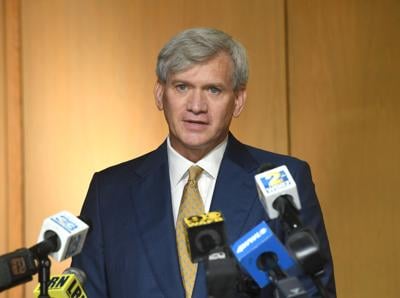When longtime Insurance Commissioner Jim Donelon decided not to run for reelection, this column posed a question: Who’d want the job anyway?
Now we know the answer. Just one guy.
His name is Tim Temple. He’s a Republican who lives in Baton Rouge and worked for much of his career in the industry the insurance commissioner regulates. And last week, he got the job without one citizen casting a vote for him (or, to be fair, against him). That’s what happens when only two candidates sign up to run and one drops out.
No offense to the commissioner-elect, but this is not a good outcome for his future constituents, who deserved — as always, but especially now — a robust discussion about how to fix a badly broken market.
That’s what everyone wants, certainly the hundreds of thousands of Louisianans feeling the pain of a homeowners insurance collapse caused largely by something beyond the control of Donelon, Temple or any other commissioner: Although insurers (and reinsurers) are in the risk business, they sure don’t seem inclined to take on exposure in a region that’s increasingly vulnerable to widescale extreme weather fueled by climate change.
Temple’s got a philosophical answer to this: He views reducing regulation as something of a magic bullet.
“We have to create a marketplace in Louisiana so that companies want to come back,” Temple has said. “When they compete, that’s when you see premiums come down.”
He hasn’t entirely spelled out what that means in terms of policy — that’s what campaigns are for — but Temple dismissed Donelon’s push earlier this year for an incentive package for insurers, saying it didn’t address the root problems. One proposal he often mentions is to allow companies to seek rate changes when they want to, not once a year, as is the case now.
Another issue to watch is a unique-to-Louisiana law that bans home insurers from dropping customers of three years or more, except under limited circumstances. Donelon, a fellow Republican who also preaches the free-market gospel but has backed balanced regulation, says the industry hates the law, but he has defended it as an important consumer protection. He did so this year against a legislative move to water it down.
Temple is likely to get plenty of support for his purist approach in a business-friendly Legislature as he pursues the feel-good goal of “affordability and availability,” as he put it to LaPolitics journalist Jeremy Alford a couple of months back.
To say that’s easier said than done is like saying that it’s hot outside. I mean, obviously.
Consider the state’s recent experience with car insurance. A few years back lawmakers passed insurer-friendly changes to how claims are handled legally, arguing that doing so would reduce rates. Rates are actually up, though, and Louisiana remains among the most expensive states in which to insure a vehicle.
There’s a competing philosophy, of course, one that doesn’t rely on giving insurers what they want and hoping the market will take care of the rest.
It argues for setting more rules for those who want to do business in the state, on the theory that government needs to advocate for the people it represents against businesses that are motivated by profit. It might even espouse a better public option than the one offered now, because, as with flood insurance, there are some risks that the private sector just doesn’t want to take on.
Whether anyone in this camp has a formula for making this all work is the question, and the fact that nobody signed up to make a case points to the difficulty in finding a suitable answer.
Still, it’s an important debate that Louisiana won’t have this fall because the election was over before it started. Louisiana’s going to with Temple’s approach, whether or not it’s the one voters would have chosen.
Although it might not seem so right now in the glow of his default victory, this isn’t a great outcome for Temple either.
He didn’t get the chance to go out and earn the voters' buy-in through a campaign, yet he’ll be the one that they blame if things don’t improve — just as the public would likely have blamed Donelon had he decided to run again.
To avoid that fate, Temple needs to do no less than convince an industry that doesn’t like losing propositions that offering affordable insurance in Louisiana is a winning one.
Piece of cake, right?

